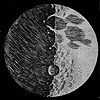|
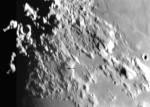 Lunar 100 Completed!
Lunar 100 Completed!
12.12.2004 | Lunnoe foto dnya
We have a winner! In the April 2004 Sky & Telescope I presented a list of 100 interesting lunar features - the Lunar 100 - and wondered how long it would be before an enterprising observer would see them all. The answer is about 7 months.
 Zebra Crater
Zebra Crater
11.12.2004 | Lunnoe foto dnya
The Zebra and the Shoeprint were nicely on the terminator when Mike Wirth took this single image in poor seeing. Look at Schickard under high sun and you can clearly see what is just barely visible under this low illumination: a light stripe crosses the middle of the crater, and its ends are dark.
 A New (Old) Lunar Atlas
A New (Old) Lunar Atlas
10.12.2004 | Lunnoe foto dnya
Amateur astronomers have observed the Moon for hundreds of years. Most have had no way to permanently record their observations, so we know only the few drawings that have been preserved by publication in ephemeral amateur journals such as the BAA's The Moon.
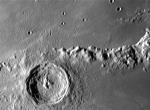 Overlooked Secondaries
Overlooked Secondaries
9.12.2004 | Lunnoe foto dnya
During the 1940s and 50s, Dinsmore Alter, the Director of Griffith Observatory, was an important expert on the Moon. Alter is most famous for his reports of obscurations in Alphonsus. His beliefs about the Moon were rather typical of the period - that is they were wrong. Alter thought that most lunar craters were volcanic calderas.
 A Long Valley
A Long Valley
8.12.2004 | Lunnoe foto dnya
Along the southern shore of Mare Nubium is a long rille that might initially be thought of as basin-concentric, like those rilles along the edges of southern Mare Serenitatis. But the Hesiodus Rille...
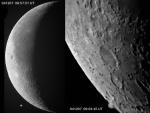 Moon Over Jupiter Over Florida
Moon Over Jupiter Over Florida
7.12.2004 | Lunnoe foto dnya
It seems we are blessed to be living at a time when astronomical rarities happen one right after another: The historic Leonid storm of a few years ago, the close approach of Mars...
 Up Close With Proclus
Up Close With Proclus
6.12.2004 | Lunnoe foto dnya
Proclus is one of the brightest - and thus presumably youngest - craters on the Moon. As the Apollo image on the right illustrates, Proclus has a very sharp rim crest and its 1060 m deep floor is filled with slump blocks (S) of material that has slid down its steep walls.
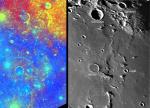 Seeing Red, and Blue and Yellow
Seeing Red, and Blue and Yellow
5.12.2004 | Lunnoe foto dnya
In a posting yesterday, Danny Caes mentioned the USGS Map-A-Planet (MAP) online software, and I realized that that powerful capability should be more widely promoted. So, delaying the promised "Up Close with Proclus" LPOD another day, here is the Clementine multi-spectral view of the fascinating area described in yesterday's LPOD.
 Ghostly Terrain
Ghostly Terrain
4.12.2004 | Lunnoe foto dnya
A broad line of ridges and half buried craters that I call the Lamont-Gardner Megadome Alignment (LGMA) is one of the Moon's unexplained mysteries. There are other ridges of ghostly craters, but this structure in northern Mare Tranquillitatis is perhaps the most bizarre.
 Telemann Flows
Telemann Flows
3.12.2004 | Lunnoe foto dnya
Geologist study units (or formations) that have consistent characteristics and hopefully ages. Two major types of units on the Moon are impact basin deposits (as at Imbrium ejecta at Fra Mauro) and mare lavas.
